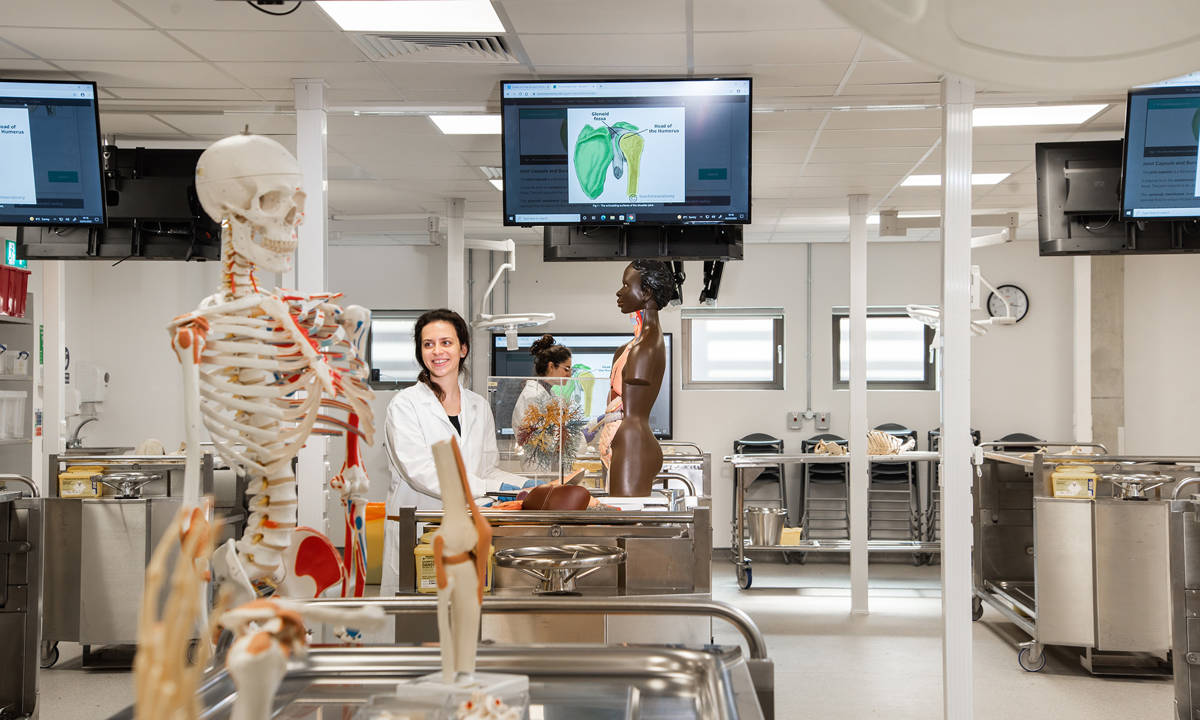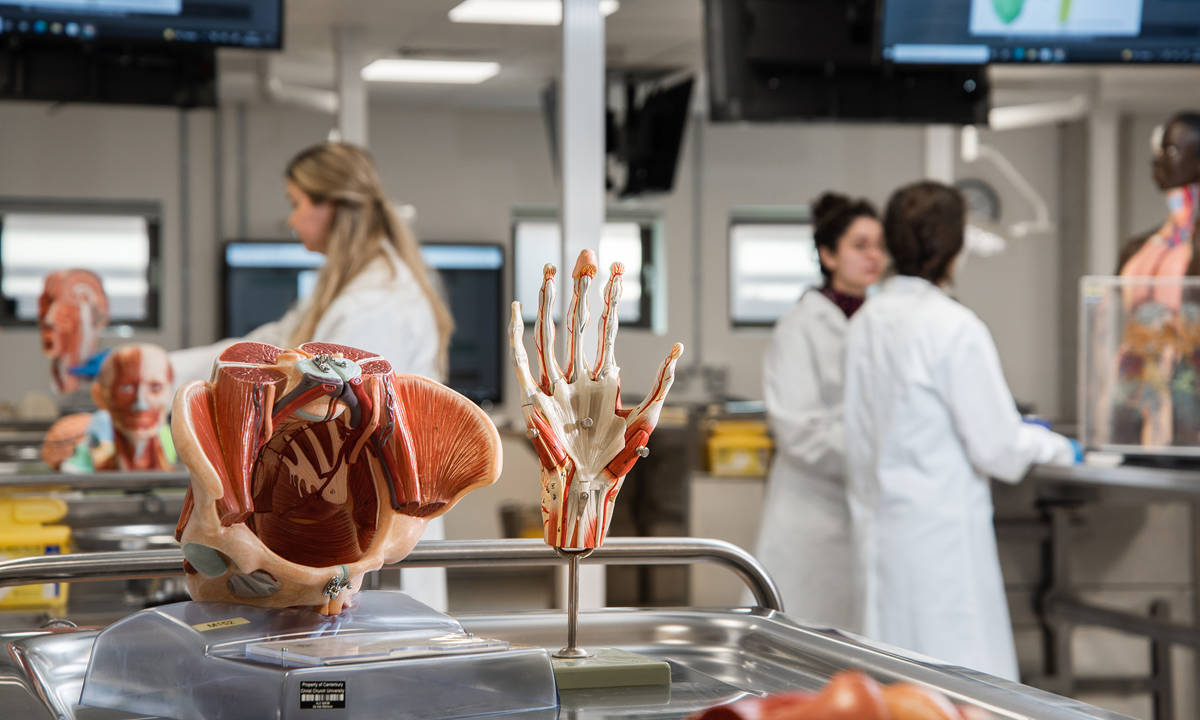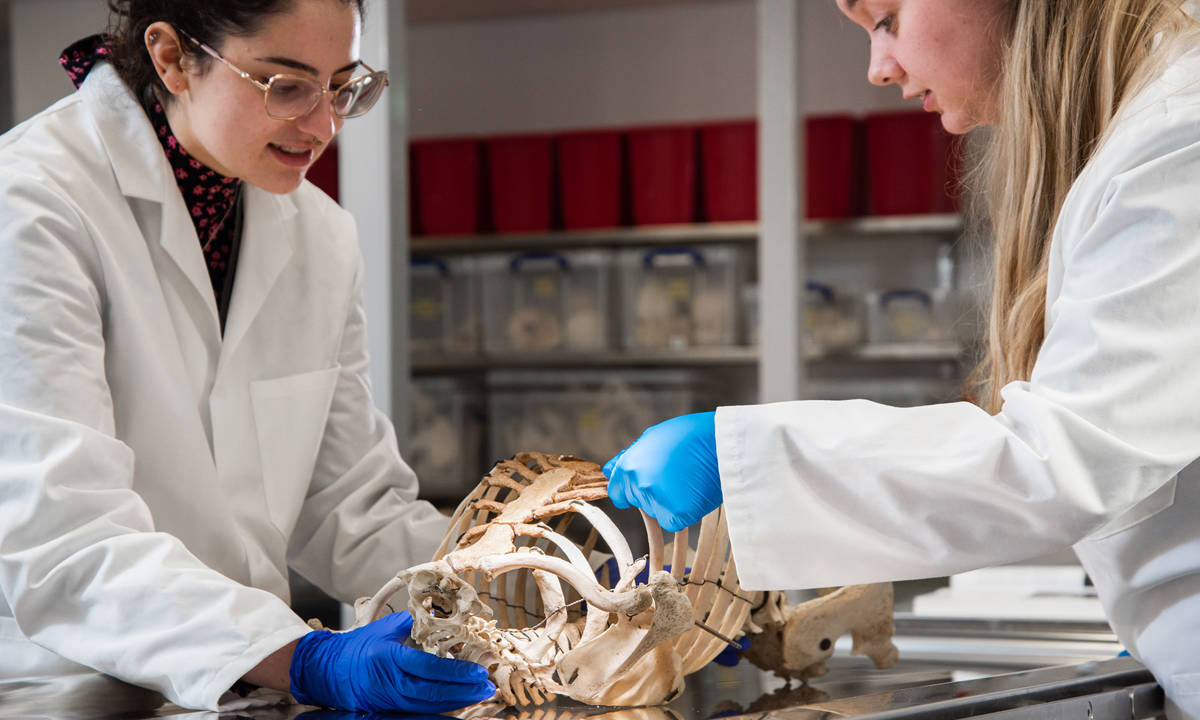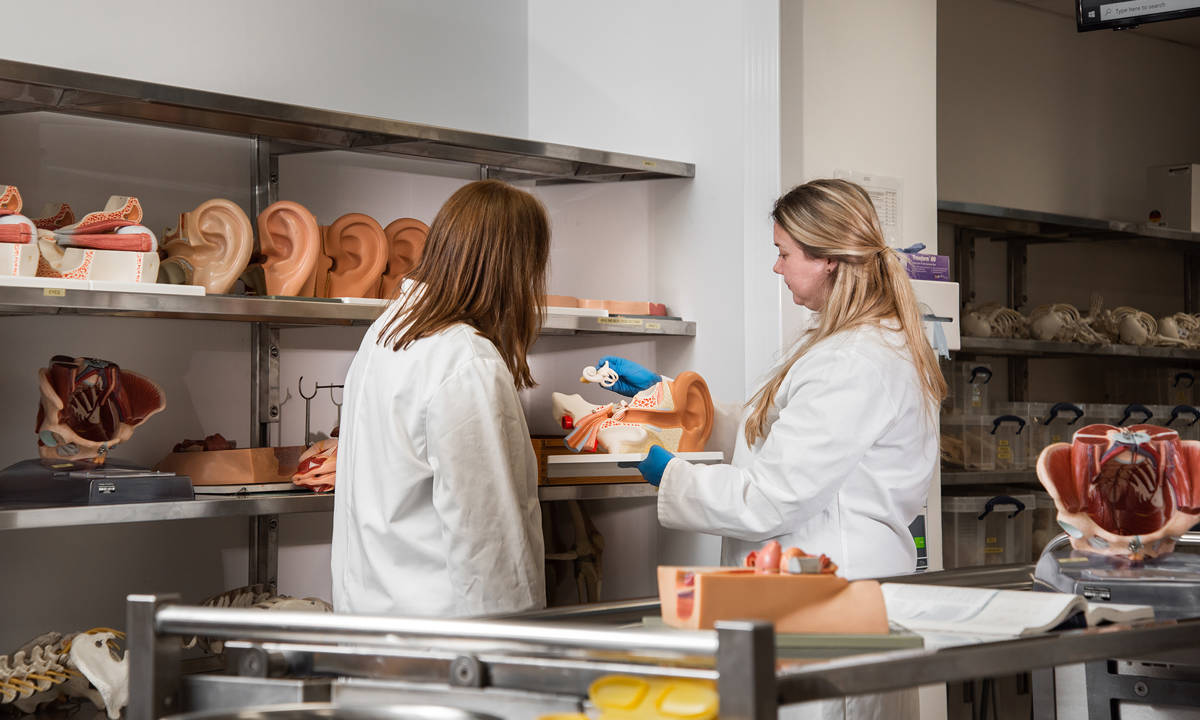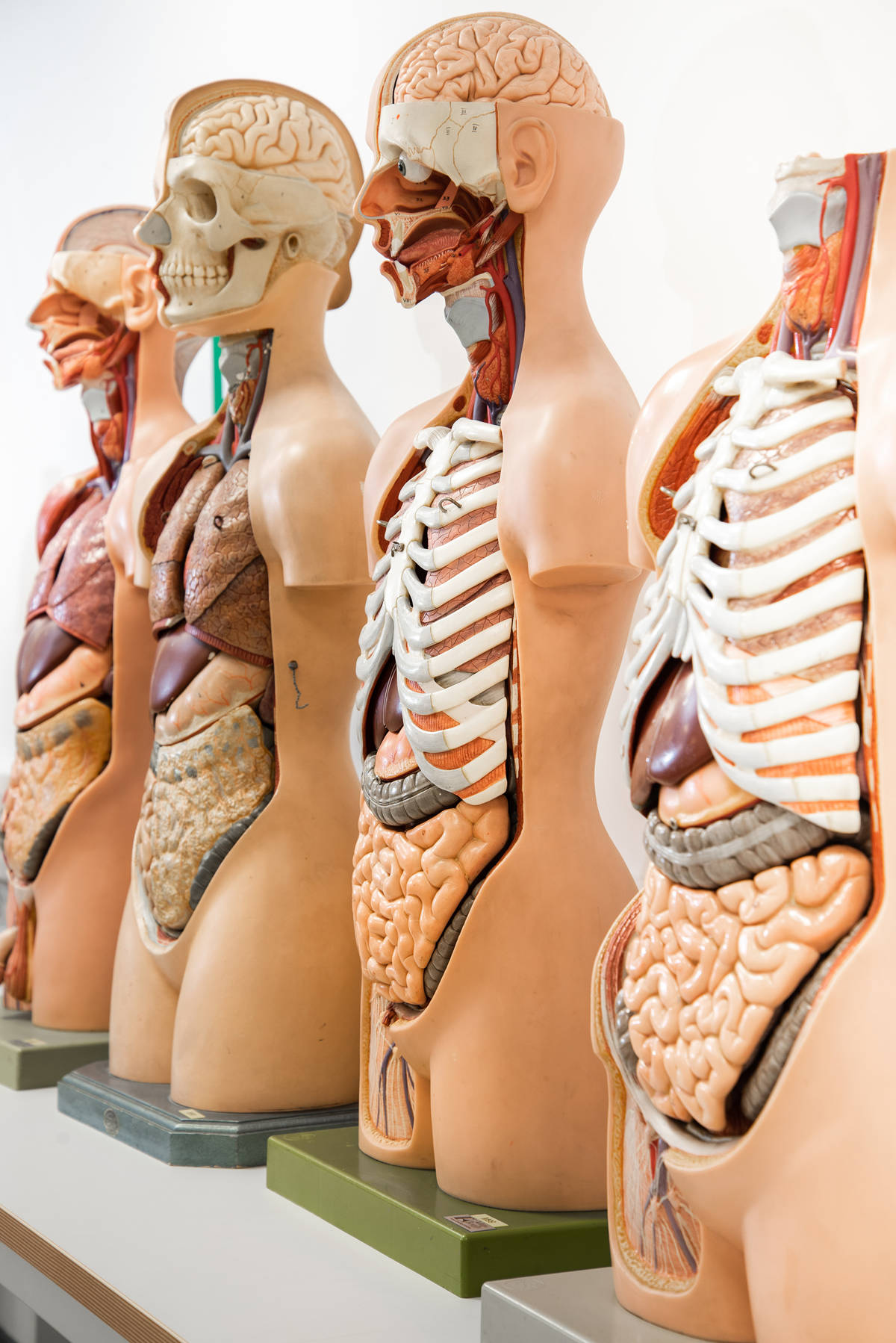The Anatomy Learning Centre (ALC) is a highly specialised anatomy laboratory and is licensed under The Human Tissue Act 2004 and regulated by the Human Tissue Authority.
The ALC is located at Canterbury Christ Church University's main campus and is part of the University’s science, technology, engineering, health and medicine building, Verena Holmes.
Check out the drone footage of our Anatomy Learning Centre.
Virtual tours
Take a look around some of our anatomy labs with these 360 degree virtual tours.
Dissection room
- 11 dissection tables (9 rotating)
- 13 Large AV screens and integrated systems
- Three ceiling mounted surgical lights with camera which link to AV system
- Two portable surgical lights
- Capacity of up to 60
- Room can be divided into two individual work areas.
Dry teaching room
- Large screen for presentation with AV that can link to the Dissection Room
- Multiple desks and chairs to provide flexible interactive learning environment
- Capacity of up to 50.
Equipment
- Human skeletal material collection
- A diverse range of anatomical models
- A range of prosections
- Dissection instruments.
Thiel embalming has many advantages over the more traditional methods of embalming. This technique enables a prolonged preservation, maintaining the colour, texture, plasticity, and flexibility, similar to a fresh specimen.
Thiel embalmed cadavers:
- maintain the fascial layers between anatomical structures
- retain lifelike colouration of musculature
- are highly flexible allowing them to be moved into any position
- can be sutured, ventilated, perfused, and insufflated
- can undergo endoscopy, bronchoscopy, arthroscopy, ureteroscopy, or laparoscopy, providing a high-fidelity simulation experience.
Imaging of the Thiel embalmed cadavers offers a very realistic experience.
Hire our facility
As a highly specialised anatomy laboratory within a university environment, we can tailor your experience to fulfil your learning requirements and cater for your specific needs.
We can provide a range of specimens for courses including full body cadaveric specimens, prosections, and plastic anatomical models. We use a range of preservation techniques, including fresh frozen, Thiel embalming, and traditional formaldehyde fixation.
Our dissection rooms are also set up with large screens and operating theatre lights with integrated cameras to aid learning and demonstration. Adjacent to the dissection rooms is an additional teaching space, set up with a large screen. It is ideal for lectures, workshops, or small group activities and can be booked in addition to the dissection rooms.
If you are interested in using our facilities to explore new surgical techniques or to improve learning, then please enquire using the e-mail below and we will contact you shortly.
Any use of the ALC facilities is subject to a charge. Full costings are always provided prior to hire agreement.
For all enquiries regarding the Anatomy Learning Centre, contact the team.
Our staff
Designated Individual on Human Tissue Authority Licence
Background:
Sam graduated with a BSc in Forensic Anthropology. Since graduation Sam worked as a licenced anatomical technician within higher education. Sam has extensive experience in Thiel embalming for cadaveric preservation and was responsible for the organisation and logistics for a multitude of internal and external surgical courses.
As the ALC Technical director and DI her responsibilities include:
- Ensure HTA licence is upheld and all HTA codes met
- Accountable for operational health and safety
- Interpret service requirements and lead on development, design and delivery
- Lead and direct technical services
- Point of contact for bequest enquiries
- Point of contact for external training courses development and implementation.
Contact:
T: +44(0)1227 923356
Background:
Helen studied Human Anatomy and Physiology BSc at the University of Liverpool. Since graduating, she completed an MPhil in women’s reproductive health, whilst working part-time as Lab Assistant in an NHS Covid testing lab. After completion of her thesis, Helen continued to work in Covid research at the University of Liverpool, before gaining employment as a histopathology medical lab assistant in the NHS.
As the ALC Senior Technician her responsibilities include:
- Providing technical support for teaching and delivery of anatomy sessions
- Preparing prosections
- Embalming
- Maintaining the ALC, including maintenance of cadavers, prosections, and the skeletal collection
- Acting as a persons designate under the Human Tissue Authority License
- Assisting with administrative and record keeping duties
- Procurement of equipment and consumables
- Ensuring health and safety protocols are followed
- Fire warden
- First aider
Contact:
E: helen.maver@canterbury.ac.uk
T: +44(0)1227 021828
Background:
Lady graduated with a BSc in Anatomy from the University of Glasgow. She has worked at the Royal College of Surgeons of England where she acted as a technical expert for a wide range of surgical skills and simulation-based courses. Lady became a museum supervisor of the Anatomy and Pathology Museum and the Hunterian Museum where she looked after a collection of more than 1,000 specimens (anatomical prosections, pathological specimens and corrosion casts) making them available for educational purposes.
As the ALC Senior Technician her responsibilities include:
- Maintaining the Anatomy Learning Centre, including maintenance of cadavers, prosections, and skeletal collection
- Provide technical support for teaching and delivery of anatomy sessions
- Procurement of equipment and consumables
- Preparation of prosections and embalming duties
- Adherence to Health and Safety guidelines
- Fire warden
- First Aider
- Acting as a persons designate under the Human Tissue Authority License
Contact:
E: ladyedith.villaroelayala@canterbury.ac.uk
Phone: +44(0)1227 921783
Bequest information and body donation
Donating your body to medical education is incredibly generous and is invaluable to the staff, students, and medical researchers. It is a personal decision that only you can make in advance with full and informed consent.
Donated bodies will be used for:
- Anatomical examination – where medical and health science students will learn about the structure and function of the human body.
- Education and training - to train a wide range of healthcare professionals including doctors, surgeons, dentists, nurses and physiotherapists.
Our donors are accepted through the London Anatomy Office. The London Anatomy Office is funded by, and accountable to, the London and South East Committee of Anatomists (LSECA).
The London Anatomy Office was established in the early 1980s to provide a central service for co-ordinating the donation of bodies to the London medical and dental schools. The London Anatomy Office has an information pack which describes the body donation process, the role of the next-of-kin, and consent forms for donation.
In acknowledgement of the generous and valuable gift of the donation of a body for anatomical examination, a service of thanksgiving is organised by the London Anatomy Office each year.
Bequest and donation contacts
Read more about the London Anatomy Office on KCL's website.
Email: lao@kcl.ac.uk
Phone: 020 7848 8042
For Further information regarding body donation please contact the ALC team by email or phone.
Email: ALC-Bodydonation@canterbury.ac.uk
Phone: +44 (0)1227 923356

